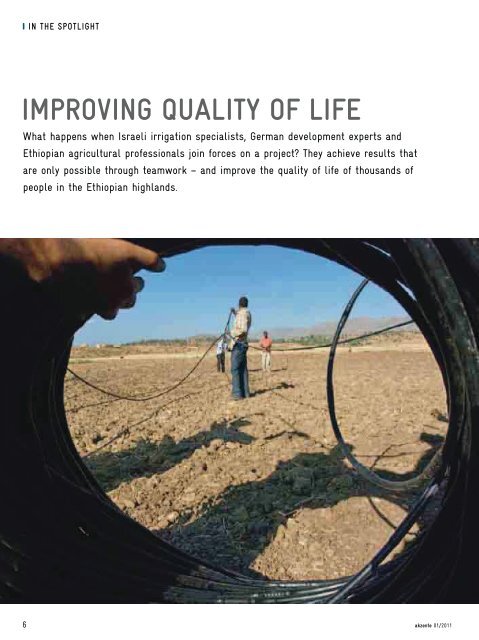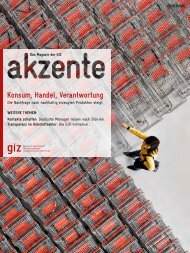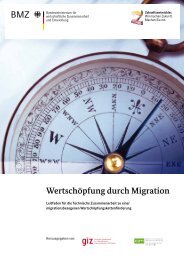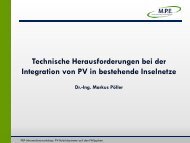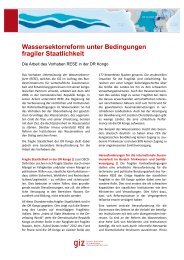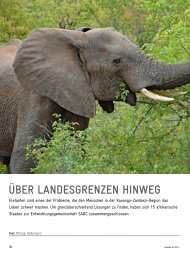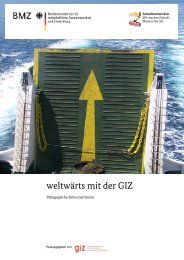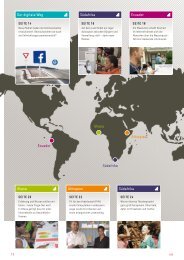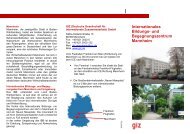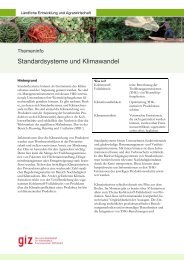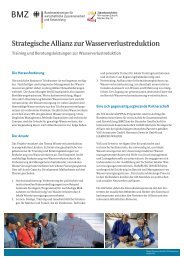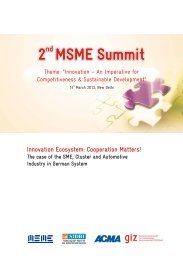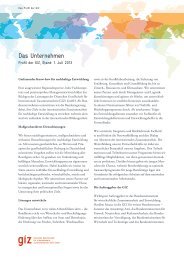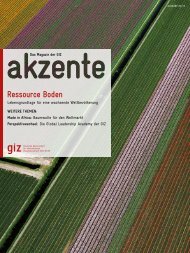Irrigation in Ethiopia (pdf, 0.23 MB, en) - GIZ
Irrigation in Ethiopia (pdf, 0.23 MB, en) - GIZ
Irrigation in Ethiopia (pdf, 0.23 MB, en) - GIZ
You also want an ePaper? Increase the reach of your titles
YUMPU automatically turns print PDFs into web optimized ePapers that Google loves.
IN THE SPOTLIGHT<br />
IMPROVING QUALITY OF LIFE<br />
What happ<strong>en</strong>s wh<strong>en</strong> Israeli irrigation specialists, German developm<strong>en</strong>t experts and<br />
<strong>Ethiopia</strong>n agricultural professionals jo<strong>in</strong> forces on a project? They achieve results that<br />
are only possible through teamwork – and improve the quality of life of thousands of<br />
people <strong>in</strong> the <strong>Ethiopia</strong>n highlands.<br />
6 akz<strong>en</strong>te 01/2011
Left: Water is delivered by hose straight to the plant without leakage. Right: Weldu Gebremeskel and his<br />
daughter Selam hope that improved water distribution will boost crop yields.<br />
Text Philipp Hedemann Photos Michael Tsegaye<br />
Gebremeskel <strong>en</strong>ergetically treadles<br />
a rather antiquated foot pump.<br />
0Weldu<br />
Slowly, water from the nearby canal<br />
fills the 500-litre tank next to him. The 68-yearold<br />
only has to pump just a few hundred times<br />
more to commission the first drip irrigation system<br />
on the plateau – on his own field! Weldu<br />
Gebremeskel is one of 400 farmers set to b<strong>en</strong>efit,<br />
along with their families, from an irrigation<br />
and water usage programme <strong>in</strong> northern <strong>Ethiopia</strong>.<br />
The triangular cooperation betwe<strong>en</strong> the<br />
<strong>Ethiopia</strong>n Governm<strong>en</strong>t, the C<strong>en</strong>ter for International<br />
Cooperation of the Israel M<strong>in</strong>istry of<br />
Foreign Affairs (MASHAV) and Germany’s<br />
Federal M<strong>in</strong>istry for the Environm<strong>en</strong>t, Nature<br />
Conservation and Nuclear Safety (BMU) is designed<br />
to help small farmers cope with the consequ<strong>en</strong>ces<br />
of climate change.<br />
The mom<strong>en</strong>t has f<strong>in</strong>ally arrived. Weldu Gebremeskel<br />
turns the blue plastic handle on his<br />
new water tank. With so many eyes watch<strong>in</strong>g<br />
him, he appears a little nervous. Tw<strong>en</strong>ty-sev<strong>en</strong><br />
agricultural experts, each with a six-day tra<strong>in</strong><strong>in</strong>g<br />
course beh<strong>in</strong>d them, had helped the small farmer<br />
to lay l<strong>en</strong>gths of perforated black plastic hose<br />
across his land measur<strong>in</strong>g barely one hectare. As<br />
Gebremeskel turns the handle, everybody stares<br />
at these perforations as if transfixed – at first,<br />
< Small farmer Weldu Gebremeskel and many<br />
helpers laid 32 irrigation hoses <strong>in</strong> his field <strong>in</strong> the<br />
<strong>Ethiopia</strong>n highlands.<br />
noth<strong>in</strong>g happ<strong>en</strong>s. But sudd<strong>en</strong>ly, a few seconds<br />
later, the first droplets emerge from the hosepipes<br />
and trickle away <strong>in</strong>to the dusty earth.<br />
Up here at an altitude of around 2,000 metres<br />
it has not ra<strong>in</strong>ed for over three months. The<br />
fierce <strong>in</strong>t<strong>en</strong>sity of the sun and the strong w<strong>in</strong>ds<br />
dur<strong>in</strong>g the dry season have left the stony land<br />
parched. But water from the new irrigation<br />
hoses is not a drop <strong>in</strong> the ocean. The dark<br />
patches of land grow larger with each droplet.<br />
At the mom<strong>en</strong>t they are still 30 c<strong>en</strong>timetres<br />
apart, but before long the dry earth betwe<strong>en</strong> the<br />
damp patches will also become moist. ‘I’m excited,<br />
happy and grateful all at once,’ says Weldu<br />
Gebremeskel. ‘The new irrigation system will<br />
give my family a better life.’<br />
The water trickl<strong>in</strong>g <strong>in</strong>to Gebremeskel’s<br />
field repres<strong>en</strong>ts the highpo<strong>in</strong>t so far <strong>in</strong> the cooperation<br />
agreed <strong>in</strong> May 2008 by the th<strong>en</strong> German<br />
Environm<strong>en</strong>t M<strong>in</strong>ister, Sigmar Gabriel,<br />
and the Israeli Foreign M<strong>in</strong>ister at that time,<br />
Tzipi Livni, to mark the 60th anniversary of<br />
the creation of the State of Israel. The two close<br />
allies wanted to work together to help African<br />
states adapt to climate change and make better<br />
use of their water resources. Just two months<br />
later the <strong>Ethiopia</strong>n M<strong>in</strong>istry of Agriculture and<br />
Rural Developm<strong>en</strong>t was brought on board. The<br />
project was launched <strong>in</strong> May 2009 for a term of<br />
three and a half years. F<strong>in</strong>anc<strong>in</strong>g is split three<br />
ways with €1.5 million com<strong>in</strong>g from the German<br />
Environm<strong>en</strong>t M<strong>in</strong>istry, US$1 million <strong>in</strong><br />
advisory services from the Israel Foreign M<strong>in</strong>is-<br />
try’s C<strong>en</strong>ter for International Cooperation and<br />
€100,000 from the <strong>Ethiopia</strong>n M<strong>in</strong>istry of Agriculture.<br />
The objective is to develop susta<strong>in</strong>able<br />
irrigation systems <strong>in</strong> twelve locations <strong>in</strong> the<br />
<strong>Ethiopia</strong>n regions of Tigray, Amhara, Oromia<br />
and the southern region. Tra<strong>in</strong><strong>in</strong>g will be provided<br />
for around 5,000 farmers and their families.<br />
Three harvests per year<br />
Weldu Gebremeskel used to draw water from<br />
the canal us<strong>in</strong>g an old diesel pump, which would<br />
leave his field flooded. Much of the water evaporated,<br />
the rest washed away valuable topsoil<br />
and left parts of the field under water, whereas<br />
other more elevated areas rema<strong>in</strong>ed bone dry.<br />
‘Us<strong>in</strong>g the old method I managed one harvest a<br />
year. The new approach should give me up to<br />
three harvests and boost the yield per harvest by<br />
as much as 50 per c<strong>en</strong>t,’ expla<strong>in</strong>s the father of<br />
sev<strong>en</strong> optimistically.<br />
Selam, Weldu Gebremeskel’s secondyoungest<br />
daughter, has come out to the field to<br />
see with her own eyes what her father has be<strong>en</strong><br />
talk<strong>in</strong>g about for so long. This young woman<br />
with a crucifix tattooed on her forehead worked<br />
for two years as a domestic servant <strong>in</strong> far-off<br />
Dubai. Now she has returned to <strong>Ethiopia</strong> to<br />
help her family, who have tilled the barr<strong>en</strong> soil<br />
of the <strong>Ethiopia</strong>n highlands all their lives. She<br />
watches att<strong>en</strong>tively as the water turns the dust<br />
<strong>in</strong>to fertile agricultural soil. ‘If this means »<br />
akz<strong>en</strong>te 01/2011<br />
7
Gad Elharar from MASHAV expla<strong>in</strong>s how the irrigation system works.<br />
» INTERVIEW<br />
‘TRIANGULAR COOPERATION’<br />
Ronit Golovaty is an irrigation and agriculture specialist for the<br />
Israeli state developm<strong>en</strong>t cooperation programme MASHAV. She is<br />
sp<strong>en</strong>d<strong>in</strong>g three years on site <strong>in</strong> <strong>Ethiopia</strong> support<strong>in</strong>g the triangular<br />
irrigation project.<br />
What new approaches are be<strong>in</strong>g tak<strong>en</strong> as a result of the cooperation betwe<strong>en</strong> <strong>Ethiopia</strong>, Israel<br />
and Germany?<br />
We use synergies to achieve results that would not have be<strong>en</strong> possible <strong>in</strong> a bilateral<br />
project. We Israelis have many years of experi<strong>en</strong>ce <strong>in</strong> irrigation. <strong>GIZ</strong> has be<strong>en</strong> <strong>in</strong>volved <strong>in</strong><br />
<strong>Ethiopia</strong> for many years and <strong>en</strong>joys a great deal of trust here. I would have be<strong>en</strong> stuck<br />
without the networks and experi<strong>en</strong>ce of my German colleagues. And because the partnership<br />
betwe<strong>en</strong> <strong>GIZ</strong> and MASHAV works so well, the <strong>Ethiopia</strong>n partner sees us as a s<strong>in</strong>gle<br />
partner.<br />
What are the major chall<strong>en</strong>ges fac<strong>in</strong>g the project?<br />
The sheer size of our project is a chall<strong>en</strong>ge. Our aim is to <strong>en</strong>g<strong>in</strong>eer the susta<strong>in</strong>able adaptation<br />
of agriculture to climate change <strong>in</strong> four regions of <strong>Ethiopia</strong> with twelve very differ<strong>en</strong>t<br />
project approaches – and all that on a tight budget <strong>in</strong> just three and a half years.<br />
What aspects are already work<strong>in</strong>g well, and where is remedial work necessary?<br />
Coord<strong>in</strong>ation processes betwe<strong>en</strong> three partners are of course bound to be somewhat<br />
time-consum<strong>in</strong>g. But tasks and responsibilities are clearly assigned, so we are able to<br />
work effici<strong>en</strong>tly. Although the project br<strong>in</strong>gs together three very differ<strong>en</strong>t work<strong>in</strong>g cultures,<br />
each partner can learn from the others.<br />
we can now harvest more chillies, tomatoes and<br />
onions from this field, th<strong>en</strong> we will also be able<br />
to sell more,’ she says. ‘And th<strong>en</strong> re<strong>in</strong>vest the<br />
money <strong>in</strong> an irrigation system for our second<br />
field.’<br />
What her father is practis<strong>in</strong>g <strong>in</strong> his small<br />
field will hopefully serve as a lesson to others.<br />
Although older <strong>in</strong> years, he rema<strong>in</strong>s youthful <strong>in</strong><br />
m<strong>in</strong>d and op<strong>en</strong> to technological advances. For<br />
this reason he has be<strong>en</strong> voted a ‘model farmer’<br />
by his village, which still uses traditional agricultural<br />
methods that have be<strong>en</strong> practised for<br />
c<strong>en</strong>turies. ‘In <strong>Ethiopia</strong> <strong>in</strong>novations are oft<strong>en</strong><br />
met with scepticism, ev<strong>en</strong> though you could<br />
hardly call what we are do<strong>in</strong>g high tech wizardry.<br />
But wh<strong>en</strong> the other farmers realise irrigat<strong>in</strong>g<br />
fields with this new technology produces<br />
higher yields, they will follow suit. Just as important<br />
as the irrigation system, however, is the<br />
more rational approach to water use. Here time<br />
is of the ess<strong>en</strong>ce; we need to achieve results<br />
quickly, s<strong>in</strong>ce climate change can no longer be<br />
ignored,’ expla<strong>in</strong>s <strong>GIZ</strong> employee Eckart Bode.<br />
He is work<strong>in</strong>g on the <strong>Ethiopia</strong>n-German Susta<strong>in</strong>able<br />
Land Managem<strong>en</strong>t programme, an <strong>in</strong>itiative<br />
f<strong>in</strong>anced by the German Federal M<strong>in</strong>istry<br />
for Economic Cooperation and Developm<strong>en</strong>t<br />
(BMZ) which <strong>en</strong>compasses the triangular<br />
partnership betwe<strong>en</strong> Israel, <strong>Ethiopia</strong> and Germany<br />
<strong>in</strong>itiated by the German Federal M<strong>in</strong>istry<br />
for the Environm<strong>en</strong>t, Nature Conservation and<br />
Nuclear Safety (BMU).<br />
8<br />
akz<strong>en</strong>te 01/2011
IN THE SPOTLIGHT<br />
Gad Elharar, who along with Weldu Gebremeskel<br />
and the 27 agricultural experts helped<br />
<strong>in</strong>stall the 32 hoses that now deliver water at a<br />
rate of 1.2 litres per hour, would not really call<br />
the irrigation system ‘technology’. The Israeli<br />
expert is normally responsible for programm<strong>in</strong>g<br />
large-scale computer-controlled irrigation systems<br />
worth millions. He has worked <strong>in</strong> over 50<br />
countries. ‘This system is low tech, of course.<br />
But it is highly effective and cheap. The farmers<br />
are able to ma<strong>in</strong>ta<strong>in</strong> the technology themselves.<br />
The hoses are produced <strong>in</strong> <strong>Ethiopia</strong> and therefore<br />
create jobs locally,’ says the tra<strong>in</strong>er. Altogether<br />
the cost of the water tank, foot pump<br />
and hoses amounts to the equival<strong>en</strong>t of €250,<br />
and thanks to improved yields the farmers will<br />
have ref<strong>in</strong>anced the <strong>in</strong>vestm<strong>en</strong>t after one year.<br />
‘Everyone can b<strong>en</strong>efit’<br />
Tsige Fesseha is also excited. She is the only<br />
woman tak<strong>in</strong>g part <strong>in</strong> the agricultural tra<strong>in</strong><strong>in</strong>g<br />
programme. ‘I come from a farm,’ says the graduate<br />
farmer, the first female <strong>in</strong> her family to go<br />
to university. ‘My par<strong>en</strong>ts farm a small field and<br />
would certa<strong>in</strong>ly b<strong>en</strong>efit from an irrigation system<br />
like this.’<br />
But ev<strong>en</strong> the most sophisticated irrigation<br />
system can be worthless if the weather conditions<br />
are not right. In northern <strong>Ethiopia</strong> there is<br />
either too much water – or too little. ‘The transition<br />
from ra<strong>in</strong>y to dry season is becom<strong>in</strong>g<br />
more and more difficult to id<strong>en</strong>tify. Oft<strong>en</strong> it<br />
doesn’t ra<strong>in</strong> for months; th<strong>en</strong> wh<strong>en</strong> the ra<strong>in</strong>s f<strong>in</strong>ally<br />
come they are heavier than ever,’ expla<strong>in</strong>s<br />
Eckart Bode. Under conditions such as these,<br />
effici<strong>en</strong>t and reliable irrigation is becom<strong>in</strong>g an<br />
ever greater necessity. That is why the <strong>Ethiopia</strong>n<br />
Governm<strong>en</strong>t decided to build a dam above<br />
Weldu Gebremeskel’s field thirte<strong>en</strong> years ago –<br />
but this failed to g<strong>en</strong>erate the expected positive<br />
impact on agriculture. Although, after the ra<strong>in</strong>s,<br />
the reservoir holds up to 1.7 million cubic metres<br />
of water, most of it simply goes to waste.<br />
‘The water runs away unchecked through<br />
tr<strong>en</strong>ches <strong>in</strong> the fields. As much as 70 per c<strong>en</strong>t is<br />
lost <strong>in</strong> this way,’ says water <strong>en</strong>g<strong>in</strong>eer Kimariam<br />
Negusse. He is stand<strong>in</strong>g up to his waist <strong>in</strong> an irrigation<br />
channel curr<strong>en</strong>tly be<strong>in</strong>g excavated by<br />
helpers from the nearby village. The contractor<br />
is re<strong>in</strong>forc<strong>in</strong>g the ail<strong>in</strong>g irrigation channels to<br />
prev<strong>en</strong>t the precious resource from trickl<strong>in</strong>g<br />
away unused on its way to the fields.<br />
One of those help<strong>in</strong>g to build the channel<br />
is 19-year-old Freweyni Mesf<strong>in</strong>. She and her<br />
fri<strong>en</strong>ds drag sandbags to the freshly dug tr<strong>en</strong>ch,<br />
which will later be l<strong>in</strong>ed with concrete. ‘It’s tir<strong>in</strong>g<br />
work, but I <strong>en</strong>joy it here,’ says the farmer’s<br />
daughter, whose family farm a small field around<br />
500 metres below the construction site. ‘First, it<br />
is a way to earn money; and secondly I know the<br />
channel will b<strong>en</strong>efit me and my family.’ Heftu<br />
Mekonn<strong>en</strong> from the Agriculture Office of Tigray<br />
prov<strong>in</strong>ce has come to the site to see how<br />
work is progress<strong>in</strong>g. The agricultural expert is<br />
very satisfied: ‘Once the channel system is complete,<br />
we will be able to irrigate 100 hectares.<br />
That will b<strong>en</strong>efit up to 2,500 people,’ he says.<br />
Mekonn<strong>en</strong> expla<strong>in</strong>s that this has ma<strong>in</strong>ly be<strong>en</strong><br />
possible thanks to excell<strong>en</strong>t cooperation betwe<strong>en</strong><br />
the project partners: ‘The Israelis are the<br />
world’s f<strong>in</strong>est irrigation experts. The Germans<br />
have be<strong>en</strong> <strong>in</strong> <strong>Ethiopia</strong> for a very long time and<br />
know how to plan and f<strong>in</strong>ance such projects.<br />
And we <strong>Ethiopia</strong>ns put the plans <strong>in</strong>to action. It<br />
all works perfectly. We should do more projects<br />
like this that provide b<strong>en</strong>efits all round,’ says the<br />
<strong>Ethiopia</strong>n.<br />
Ev<strong>en</strong> if he is not familiar with the term ‘triangular<br />
cooperation’, Weldu Gebremeskel<br />
would doubtless subscribe to this view. The follow<strong>in</strong>g<br />
morn<strong>in</strong>g he returns to plant his seedl<strong>in</strong>gs<br />
<strong>in</strong> the patches of dark earth, ev<strong>en</strong>ly moist<strong>en</strong>ed<br />
by the black hoses. In just two months<br />
the farmer hopes to harvest and sell his first<br />
crop of tomatoes. He has already calculated exactly<br />
how many metres of new irrigation hose<br />
he will be able to buy for his second field us<strong>in</strong>g<br />
the profits.<br />
> CONTACT<br />
Eckart Bode > eckart.bode@giz.de<br />
> HOW DOES TRIANGULAR<br />
COOPERATION WORK?<br />
Triangular cooperation br<strong>in</strong>gs together a<br />
‘traditional donor’, <strong>in</strong> the case of the irrigation<br />
and water usage programme <strong>in</strong><br />
<strong>Ethiopia</strong>, this is the German Governm<strong>en</strong>t;<br />
a ‘new donor’, oft<strong>en</strong> an emerg<strong>in</strong>g country<br />
such as Brazil, Thailand or, here, Israel;<br />
and a third b<strong>en</strong>eficiary country, <strong>in</strong> this<br />
case <strong>Ethiopia</strong>. All partners make their<br />
own contributions to the project, each of<br />
which complem<strong>en</strong>ts the others.<br />
Triangular cooperation is se<strong>en</strong> as the<br />
way forward <strong>in</strong> terms of restructur<strong>in</strong>g<br />
<strong>in</strong>ternational relations. It is a new partnership<br />
tool that complem<strong>en</strong>ts previous<br />
forms of South-South and North-South<br />
cooperation.<br />
The Federal Governm<strong>en</strong>t of Germany has<br />
committed itself to promot<strong>in</strong>g triangular<br />
cooperation arrangem<strong>en</strong>ts, contractually<br />
declar<strong>in</strong>g the follow<strong>in</strong>g <strong>in</strong> the coalition<br />
agreem<strong>en</strong>t of 2009: ‘We want cooperation<br />
with emerg<strong>in</strong>g countries to develop<br />
<strong>in</strong>to partnerships for the susta<strong>in</strong>able<br />
shap<strong>in</strong>g of globalisation based on mutual<br />
responsibility, and particularly favour<br />
triangular cooperation. We will <strong>in</strong>volve<br />
ourselves primarily <strong>in</strong> areas of significant<br />
jo<strong>in</strong>t <strong>in</strong>terest such as promot<strong>in</strong>g<br />
the rule of law, <strong>en</strong>vironm<strong>en</strong>tal and climate<br />
protection and sci<strong>en</strong>tific cooperation.’<br />
<strong>GIZ</strong> supports a series of triangular<br />
projects on behalf of the German Federal<br />
M<strong>in</strong>istry for Economic Cooperation<br />
and Developm<strong>en</strong>t (BMZ), as well as other<br />
federal m<strong>in</strong>istries. Chile, Brazil, Russia,<br />
Costa Rica, Thailand, Israel, Mexico<br />
and South Africa, for example, are tak<strong>in</strong>g<br />
on the role of ‘new donors’, while<br />
countries such as Mozambique, Guatemala,<br />
Paraguay, Laos and <strong>Ethiopia</strong> are<br />
the b<strong>en</strong>eficiary third partners.<br />
akz<strong>en</strong>te 01/2011<br />
9


